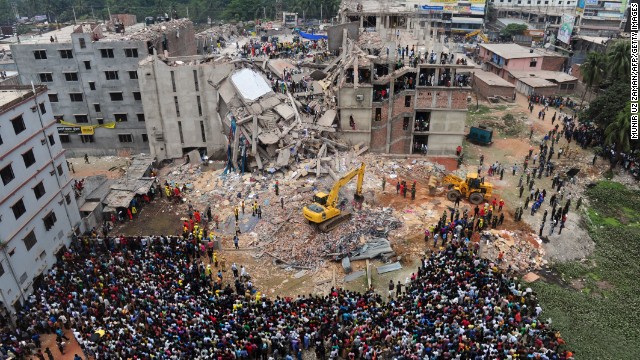What must it be like: to have one's leg trapped underneath a heavy concrete beam, bones crushed, blood gushing out. Ceiling has fallen down and is pressing you to the floor. It is an enclosed space. Soundless. In the silence and darkness, you hear your pain, fear, hopelessness. That's it. That's the potential power of the event: to tell you what it is capable of.
This is exactly what some of our fellow human beings might be undergoing underneath the rubble of a collapsed building in Bangladesh. More than 300 people have died. Still, people are being pulled out alive from the rubble after days of the disaster.
What is outrageous is that the treachery of the event is actually traceable to controllable factors. It was avoidable. And that this is not an isolated event. These kinds of events have happened several times in the past: sometimes as fires swallowing up lives, sometimes as buildings crumbling down, crushing and burying lives.
To add to that outrage, the victims seem to be the vulnerable amongst us. These have been workers working under very poor conditions. They might be the sole breadwinner in the household. At the most recent event, many of them were women: mothers, sisters, daughters in the household. This selective involvement from these disasters further outrages us prodding us to question what leads to this? What factors might be responsible?
Is it greed? An unbridled greed to make profits at any costs. These garment factories account for 3/4th of Bangladeshi exports. They are businesses driven by profit. Profit in a competitive world where you want to produce quality products at the lowest prices. I can imagine of a cut-throat competition among these factory owners: to squeeze out their labor force, to maximize profits. Even then, would this businessman (or businesswoman) deliberately think about allowing people to die like this? I would imagine not. Then what goes in to create these crumbly buildings, inflammable buildings expedient at choking souls to death?
I can imagine of multiple things. A miniscule investment to make a building. An architect who is not very competent at designing buildings or is just careless. A contractor who shortchanges building materials to minimize his expenses. Building materials which are subpar. Working conditions where the building holds people and materials way beyond its capacity.
At each of these levels, do the responsbile people think of what the consequences could be if their responsibilites are shortchanged? Or have they been so habituated to doing it day-in and day-out that it is now just an abstract concept that escapes their daily activities.
In the immediate context, it is widely apparent that the incompetence and irresponsibility is killing lives and inflicting suffering. The main question is how can this be changed?
This is exactly what some of our fellow human beings might be undergoing underneath the rubble of a collapsed building in Bangladesh. More than 300 people have died. Still, people are being pulled out alive from the rubble after days of the disaster.
 |
| Source: CNN (www.cnn.com) |
To add to that outrage, the victims seem to be the vulnerable amongst us. These have been workers working under very poor conditions. They might be the sole breadwinner in the household. At the most recent event, many of them were women: mothers, sisters, daughters in the household. This selective involvement from these disasters further outrages us prodding us to question what leads to this? What factors might be responsible?
Is it greed? An unbridled greed to make profits at any costs. These garment factories account for 3/4th of Bangladeshi exports. They are businesses driven by profit. Profit in a competitive world where you want to produce quality products at the lowest prices. I can imagine of a cut-throat competition among these factory owners: to squeeze out their labor force, to maximize profits. Even then, would this businessman (or businesswoman) deliberately think about allowing people to die like this? I would imagine not. Then what goes in to create these crumbly buildings, inflammable buildings expedient at choking souls to death?
I can imagine of multiple things. A miniscule investment to make a building. An architect who is not very competent at designing buildings or is just careless. A contractor who shortchanges building materials to minimize his expenses. Building materials which are subpar. Working conditions where the building holds people and materials way beyond its capacity.
At each of these levels, do the responsbile people think of what the consequences could be if their responsibilites are shortchanged? Or have they been so habituated to doing it day-in and day-out that it is now just an abstract concept that escapes their daily activities.
In the immediate context, it is widely apparent that the incompetence and irresponsibility is killing lives and inflicting suffering. The main question is how can this be changed?
No comments:
Post a Comment